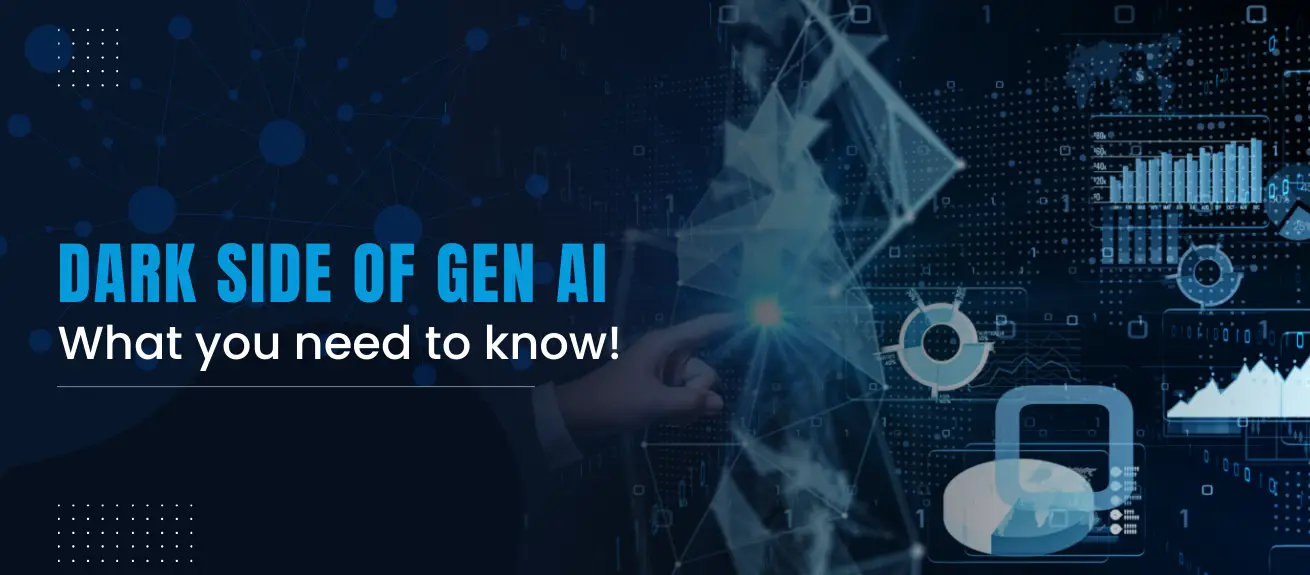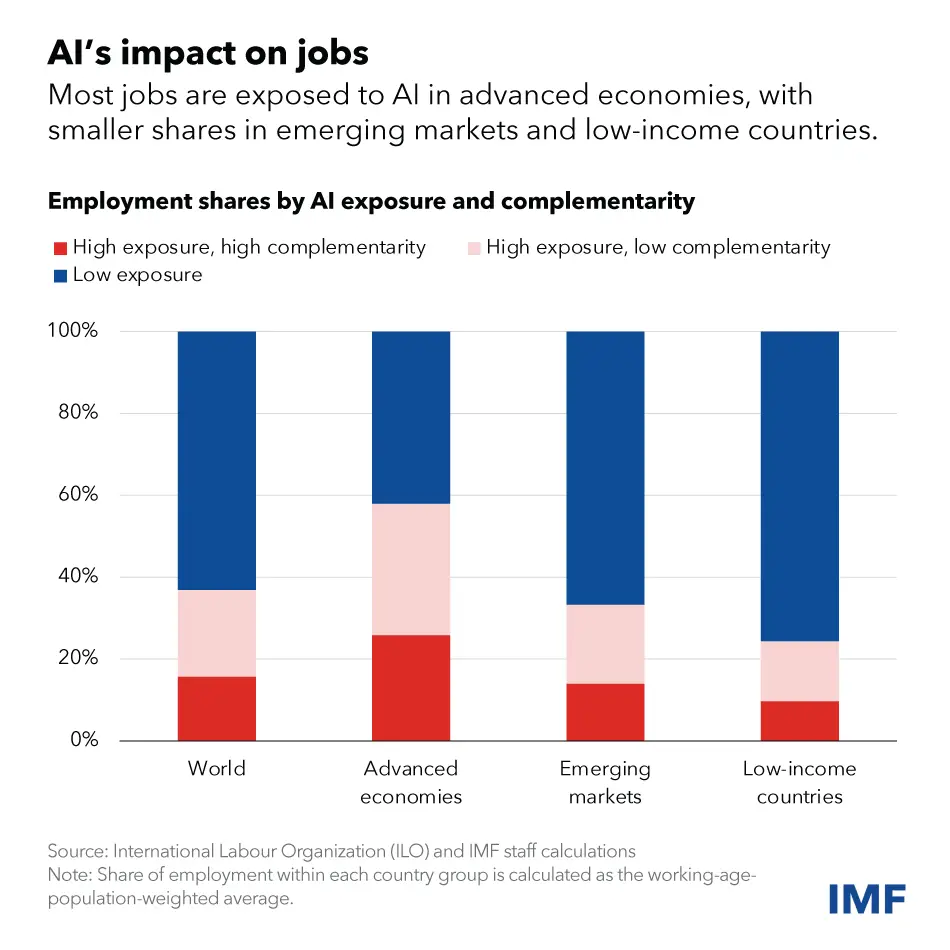
The Dark Side of Gen AI
- Date July 14, 2024
Introduction To Gen AI
Hey there! So, you’ve probably been hearing a lot about Gen AI lately, right? It’s everywhere – from those freakishly accurate recommendations on your favorite shopping site to virtual assistants making dinner reservations for you. It sounds like we’re living in the future! But, like every shiny new thing, there’s a bit of a darker side to it. Interested? Let’s dive deep!
The Bright Side Before the Dark
Before we get all gloomy, let’s not forget the incredible feats of Gen AI. These smart algorithms help doctors diagnose diseases earlier, make our roads safer with autonomous vehicles, and heck, they even manage to find us the perfect playlist for our mood swings. It’s not all doom and gloom, machine learning, natural language processing and computer vision breakthroughs have brought a new era of automation and intelligent system. But it’s crucial to peek behind the curtain.
Walking into the Shadows
Alright, brace yourselves. We’re venturing into some of the more, let’s say, “unsettling” alleys of Gen AI’s metropolis.
Ethical Concerns
Bias and Discrimination
Ever got unfairly tagged by an automated system? That’s because, in some cases, the AI learns from data that’s as biased as humans. Yep, machines pick up our bad habits.
They may provide results that discriminate against people based on their gender, race, age, health, religion, handicap, sexual orientation, or other factors.
The fact that AI systems learn from data does not mean that their outputs will not have discriminating impacts. The data used to train and test AI systems, as well as how they are created and used, may result in AI systems that discriminate against specific populations without objective explanation.
Privacy Concerns
Our digital footprints are everywhere, and Gen AI is the Sherlock Holmes of data. But imagine Holmes going through your diary. Feels invasive, right? That’s the kind of privacy dance we’re talking about.
Surveillance technologies that are powered by Artificial Intelligence, such as facial recognition systems and location tracking make you question mass surveillance and violation of individual privacy rights.
AI systems are also constantly under threats like data breaches or data leakage. Malicious personnels can exploit this to gain sensitive information.
Economic Impacts
Job Displacement
Robots taking over jobs isn’t just science fiction anymore. From factory workers to believe it or not, writers, AI’s making a play for many roles. What happens when the music stops and there are fewer chairs than people?
In all sense AI is not the first technology that has caused a concern about jobs. Every piece of technology during its evolution has caused major concerns, but the truth is that such technologies create more jobs than they take.
Economic Inequality
Picture this: the AI whiz kids get wealthier, while those replaced by AI… don’t. It’s like the rich getting a turbo boost while the rest are on a treadmill. Not the ideal kind of future, huh?
AI may also have an impact on intra-country income and wealth disparity. We may witness income polarization, with workers who can use AI increasing their productivity and pay while those who cannot fall behind. According to analysis artificial intelligence can assist less experienced people increase output more quickly.
Safety and Security Risks
Autonomy and Control
Ever felt like your smartphone knows you too well? As AI grows, the fear is handing over the steering wheel, letting it make decisions for us. Could we wake up to a world deciding what’s “best” for us without asking?
It appears that AI systems can considerably boost our autonomy. They can provide us with more information to help us make better decisions, and they may enable us to achieve many of our objectives more effectively and efficiently. However, it is becoming clear that AI systems offer several risks to our autonomy. One (but not the only) example is that they allow for the widespread and covert employment of manipulative and deceptive strategies designed to target and exploit well-documented flaws in our decision-making.
AI may also have an impact on intra-country income and wealth disparity. We may witness income polarization, with workers who can use AI increasing their productivity and pay while those who cannot fall behind. According to analysis artificial intelligence can assist less experienced people increase output more quickly.
Weaponization of AI
This is where it gets a bit Hollywood – AI being used in warfare or by criminals. Imagine drones deciding on targets or hackers using AI to breach security. The plot of every second sci-fi movie suddenly doesn’t seem too far-fetched.
Lethal autonomous weapons of war efficiently using AI are either under development or are already developed these include autonomous stationary sentry guns and remote weapon stations designed to fire at humans and vehicles, autonomous killer robots most popularly known as “Slaughter Bots” are designed to attack targets without the need for a pilot.
Armed, completely autonomous drone swarms are expected to become future weapons of mass destruction because they combine two characteristics that distinguish previous weapons of mass destruction: mass harm and a lack of human control to guarantee civilians are not harmed.
The Psychological Impact
Dependency on Technology:
Remember the last time you left your house without your phone? Panic mode, right? As AI seeps deeper into our lives, the bigger our dependency grows. It’s like we’re slowly becoming part of a digital hive mind.
AI uses powerful technologies to comprehend human behavior. Machine learning, natural language processing, and other technologies analyze human needs when searching or texting on devices such as computers and smartphones. Such data assists artificial intelligence in recommending the human’s interests by studying their behavior and providing adverts tailored to their specific interests. AI stores signals from the internet and helps humans find relevant information based on their needs.
Impact on Mental Health
All these notifications, recommendations, and virtual lives can be overwhelming, leading to anxiety and a constant state of FOMO (fear of missing out). It’s essential to remember to disconnect and breathe.
Additionally, social media recommendation systems powered by AI are found to have the potential to lead humans into having unfavorable psychological effects like addiction, concern with self-confidence, social comparisons and many more…
Social media uses AI to personalize content for an individual including daily feeds. While this sounds efficient it can also be dangerous considering the risk of developing feelings of isolation, anxiousness and depression. These algorithms can be used to manipulate users therefore leading them to psychological harms.
Navigating the Dark
So, here we are, having discovered the dark alleys of Gen AI. But it’s not all despair. Awareness, stronger regulations, transparent AI ethics, and a balanced approach towards technology can light the way. We’ve got the tools; we just need to wield them wisely.
AI systems will interconnect and collaborate to anticipate and respond to our human needs and emotions. The growing consensus that AI should benefit society as a whole prompts calls to facilitate the adoption of AI systems to promote innovation and growth, assist in addressing global challenges, and boost job and skill development, while implementing necessary safeguards to ensure these systems are open and plausible and acknowledge human rights, democracy, culture, equality, privacy and control, safety, and security.
To minimize the negative effects of AI a couple strategies can be employed:
- Relocating Industries-This involves relocating industries that heavily rely on low-skill and hard labor jobs to areas where AI is not very prevalent.
- Changes in Education System-More focus on encouraging skills like creativity, critical thinking and problem solving which are less likely to be replaced by AI. Doing this will prepare individuals to tackle market changes.
- Formulating laws, principles and methods for regulating AI-This can help attenuate the impact of AI on society.
Conclusion
While AI can positively improve our lives, it is critical to recognize and address the negative consequences it may have on society. Collaboration among researchers, policymakers, and industry professionals is critical for maximizing the benefits of AI while reducing harm. Implementing strong rules, maintaining openness and accountability, and encouraging inclusive AI development can help us negotiate the hurdles and design a future in which AI is a force for good in society. Let us strive to create an AI-powered world that is fair, ethical, and concerned about the well-being of all its citizens.
Gen AI, like any powerful tool, wields both incredible promise and undeniable risks. Embracing its benefits while safeguarding against the dark sides is the tightrope walk of our generation. It’s crucial we proceed with caution, foresight, and a dash of optimism. After all, the future isn’t written yet – we’re the ones holding the pen.
Frequently Asked Questions
Welcome to the FAQ section for our blog post on unlocking the secrets of Gen AI and the essential tools required for success. Here are some common questions and answers to help you grasp the essence of this transformative topic:
Although AI can automate certain tasks, many jobs require human empathy, creativity, and judgment – attributes that AI lacks.
Currently, AI does not possess self-awareness or consciousness. It operates within the parameters set by its creators and the data it’s fed.
Being cautious about the information you share online, using privacy-focused services, and advocating for stronger data protection laws can help safeguard privacy.
International cooperation, ethical AI frameworks, and robust cybersecurity measures are essential to mitigate the misuse of AI technologies
Following reputable technology news sources, participating in forums, and engaging in discussions can keep you informed about the latest in Gen AI.
You may also like

AI Skills to Break the Internet: Your Guide to Going Viral!

Unveiling AI Strategies of Millionaires




